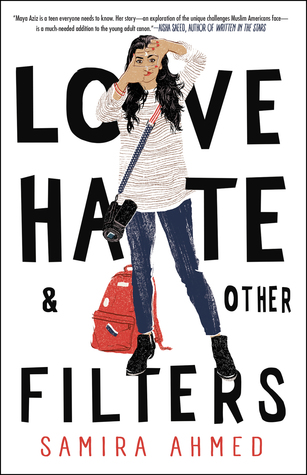Description: Maya Aziz is torn between worlds. There's the proper one her parents expect for their good Indian daughter: a good school, an arranged marriage. And then there is the world of her dreams: going to film school, living in New York City, pursuing the boy she's liked for ages. But unbeknownst to Maya, there is a danger looming beyond her control. When a terrorist attack occurs in another Midwestern city, the prime suspect happens to share her last name. In an instant, Maya's community, consumed by fear and hatred, becomes unrecognizable, and her life changes forever.
Review: I was really looking forward to picking up Samira Ahmed's debut novel, Love, Hate & Other Filters because it featured a Muslim main character, took place in Illinois, and tackled Islamophobia. While I did like some aspects of the book and think it is worthwhile to read, I did have several issues with it.
Maya Aziz wants to go to film school and attend NYU to pursue her dreams of being a documentary filmmaker. She secretly applied to NYU and got accepted, but her parents think she will attend a local college. With her parents expectations combined with anti-Muslim backlash from a recent terror attack threatens to derail Maya's dream.
Rating: 2 stars
Words of Caution: There is some language and a scene of physical assault in the book. Recommended for Grades 8 and up.
If you want a book that does a better job explaining Islamophabia and having conflicts with ones Islamic culture try: The Lines We Cross by Randa Abdel-Fattah, Ten Things I Hate About Me by Randa Abdel-Fattah
Review: I was really looking forward to picking up Samira Ahmed's debut novel, Love, Hate & Other Filters because it featured a Muslim main character, took place in Illinois, and tackled Islamophobia. While I did like some aspects of the book and think it is worthwhile to read, I did have several issues with it.
Maya Aziz wants to go to film school and attend NYU to pursue her dreams of being a documentary filmmaker. She secretly applied to NYU and got accepted, but her parents think she will attend a local college. With her parents expectations combined with anti-Muslim backlash from a recent terror attack threatens to derail Maya's dream.
I have conflicting thoughts about Maya. I admire her tenacity and her ambitions of perusing a life that is not of a traditional Indian woman (i.e. going to the medical, engineering, law fields of study). I also respect her insistence of establishing her independence, however she has little to no pride of her Indian culture and blames almost everything she thinks she can’t have on her cultural constraints and on the fact that she’s different. There were many times where I pictured her as a petulant child who stomped her foot and yelled whenever she was refused something she wanted without giving any consideration to her parents' point of view. Her repetitive phrase of wanting to be "normal" got on my nerves because it implied being anything but a white, Christian girl is abnormal. I also found it very hard to believe that Maya never felt isolated being the only Indian American Muslim at her school.
While her Indian American identity is discussed or rather ranted about throughout the novel, there is little to no discussion of her Muslim identity. If it was not for the references of the Quran or going to the mosque made by her parents or her common Muslim last name of Aziz, the reader would not know of her Muslim identity. There is a moment in the book where Kareem, a potential love interest, drinks wine though it is forbidden in Islam to drink alcohol. It is laughed off that Kareem observes Islam in other aspects except this one really rubbed me the wrong way. I understand that author might be showing readers that people observe religion in their own ways, but this was a missed teaching moment. While Maya is not a religious person, a lot of the "constraints" she feels is closely tied to her religion. Her issues are very relevant to Muslim teens today and I wished they were talked about in the book. The author instead zeroes in on the romance aspect of the book, which fell totally apart for me. Phil, Maya's very bland love interest, and their drama took me out of the book. I kept waiting for something meaningful to happen. It is not until half way of the book that we see Maya being affected by Islamophobia in the book, both from the backlash of the terror attack and her parent's tighter restrictions.
I know that not every #ownvoices Muslim novel will not mirror my life and it is only an indication that we need more stories, but you can't write a book where religion is a central theme of the book and not talk about it. Personally, I felt very disappointed with the book and I understand why so many of my students returned the book without finishing it. I'm not saying Maya's story is unimportant, it is, but it barely skims the surface.
Rating: 2 stars
Words of Caution: There is some language and a scene of physical assault in the book. Recommended for Grades 8 and up.
If you want a book that does a better job explaining Islamophabia and having conflicts with ones Islamic culture try: The Lines We Cross by Randa Abdel-Fattah, Ten Things I Hate About Me by Randa Abdel-Fattah













I think it would bother me as well. Doesn’t make sense that it would skip the religious aspect. Sorry this one wasn’t representative and disappointing.
So disappointing when an opportunity for education and understanding is squandered!